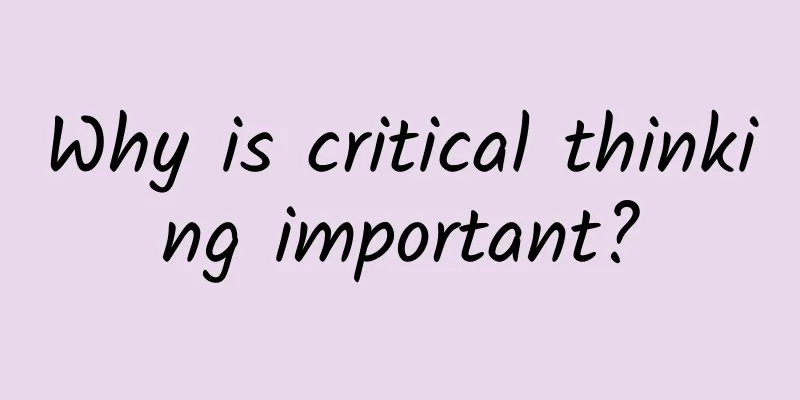Why is critical thinking important?

|
Every day, we are exposed to a lot of information, choose to believe some of it, and decide our behavior based on it. Critical thinking can provide guidance for beliefs (what to believe) and actions (what should be done). To put it bluntly, it is the ability to choose what to believe and decide what to do. Because beliefs and actions, big and small, shape us and our life trajectories, it is particularly important to train critical thinking. Otherwise, we will be blinded by slander, manipulated by rumors, intimidated by scaremongering, used by rumors, teased by lies, and even more tragically, become hosts and spread these false or bad things. Written by Li Qingchao (Shandong Normal University) Critical thinking is important There are many ways to describe the concept of "critical thinking". Here we quote Robert H. Ennis's statement: Critical thinking is the intellectual training process of actively and skillfully conceptualizing, applying, analyzing, synthesizing, and evaluating information collected or generated from observation, experience, reflection, reasoning, or communication. As a skill recognized by the international education community as necessary for creating knowledge and making reasonable decisions, it is one of the basic abilities that citizens should possess, just like reading and writing. Critical thinking skills are a kind of universal thinking skills required in many fields, which can improve people's language and expression skills, promote creativity, and facilitate self-reflection. Furthermore, good critical thinking is the foundation of science and democracy. Figure: A report released by the World Economic Forum in 2016 listed critical thinking as the second most important employment skill, the first being the ability to deal with complex problems, and the third being creativity. The critical thinking process is thinking about the thinking process. This ability or habit needs to be trained to acquire. "Really? I feel that I have it." If you think that life is very peaceful and everyone is rational, then you can go and read the social news. Every party involved in an absurd event has a set of "strict" logic of their own, and their logic is full of holes like a basket, and even in the eyes of outsiders, it is directly "naked" and there is no logic at all. The word "absurd" gives people a false sense of rarity and scarcity, but in fact, rationality is truly precious. Most of the decisions we make may rely solely on instinct and habit, driven by likes and dislikes and experience, and supplemented by poor evidence. causation Causation is the relationship in which one event (cause) causes another event (effect). A deep understanding of causation can help people understand the laws of the world, so as to create the conditions for good results and make things go in a direction that is beneficial to people; eliminate the factors that lead to bad results and avoid things from developing in an unfavorable direction. Therefore, causation is a theory that people tend to establish and act on. Although in reality there are common complex situations such as one cause and multiple effects, one effect and multiple causes, distant causes and recent effects, ancient causes and modern effects, people tend to recognize direct, dominant, and transformable causal relationships - all troubles seem to be rooted in the natural selection of life, but so what? We can't learn from Thanos. After this! When understanding causal relationships, the most commonly used and most intuitive observation standard is that the cause and effect have a relationship of sequential or simultaneous occurrence. But here we must emphasize that if two events have a causal relationship, then they have a temporal relationship of sequential or simultaneous occurrence; but a temporal relationship of sequential or simultaneous occurrence does not necessarily mean that they have a causal relationship. Let's take the process of understanding the relationship between smoking and lung cancer as an example to understand the research process of causal relationships. Lung cancer is currently the most common type of cancer in terms of both morbidity and mortality. In 2020, 2.2 million people worldwide were diagnosed with lung cancer, and 1.8 million people died of the disease that year[1]. In fact, lung cancer was once a rare disease. In autopsies conducted by the Institute of Pathology at the University of Dresden in 1878, lung cancer accounted for only about 1% of malignant tumors. However, in the following decades, lung cancer accounted for more than 14%. Franz Müller of Cologne Hospital keenly noticed that most cancer patients had the habit of smoking. He counted the changes in per capita cigarette consumption and lung cancer incidence, and compared 86 lung cancer cases with a similar number of cancer-free controls, indicating that smokers were much more likely to develop lung cancer. Müller's study, published in 1939, established a correlation between tobacco smoke and lung cancer[2]. Figure: Changes in per capita cigarette consumption and lung cancer deaths per 100,000 people in the United States between 1900 and 2000. Note that the trends are highly similar, but the peak times differ by more than 20 years. [3] Is that the reason? Correlation is a relationship between phenomena, things, numbers or statistical variables. This relationship is a covariation relationship that cannot be explained by randomness or chance alone. The existence of correlation does not directly prove that there is a causal relationship between the two. It only describes the non-random covariation relationship between the two, indicating that there may be a causal relationship between the two. However, if we conclude that there is a causal relationship simply because of correlation, we will commit the classic logical fallacy of "after this, because of this": just because they happen one after another, we assume that there is a causal relationship. As for whether there is a specific causal relationship between two events in correlation, the following situations need to be excluded: 1. Reverse causation: There is a causal relationship, but the causal relationship is misunderstood, that is, what you think is the cause is actually the effect, and what you think is the effect is actually the cause. Medieval Europeans believed that lice were good for human health because sick people rarely had lice. Lice were more or less correlated with human health, but the causal relationship between the two was misinterpreted. The real reason was that lice were extremely sensitive to body temperature, and when a patient was sick and had a fever, the lice left the patient to find another host. 2. A third factor causes a common variable: Also known as the third factor fallacy. That is, there is no causal relationship between the two related events, and they are both caused by the change of a third factor, so it seems that a covariation relationship has occurred. In 1999, Nature magazine reported a study showing that infants and young children who sleep with the lights on are more likely to develop myopia in their later life. This study has aroused great interest. However, subsequent studies have found that the real situation is that myopic parents are more likely to take care of their infants and young children with the lights on, and the children of myopic parents are also more likely to develop myopia. In other words, the two related factors of sleeping with the lights on and myopia in children are two results caused by myopic parents. 3. Bidirectional causality: Causation is not necessarily unidirectional. For example, the number of predators and prey has a covariant relationship, and their changes in numbers are causally related to each other, rather than a simple, fixed one being the cause and the other the effect. 4. Pure coincidence: Given enough time, a chaotic enough world, and enough records, it is always possible to find sets of events that support specific correlations, but in fact have no causal relationship between them. According to research, Russian leaders have alternated between bald-not-bald-bald, a phenomenon that can be traced back to Nicholas I in the early 19th century and up to today's Vladimir Putin. Ahem, is there anything more addictive than a Russian joke? Figure: The phenomenon of bald and non-bald leaders taking over in Russia[4] The “Road to Promotion” of “Relevance” The correlation between two events is one of the reasons that motivates people to explore the causal relationship. However, for correlation to rise to causality, some necessary conditions must be met or necessary research must be conducted: Causation is consistent: the same causes lead to the same effects. Causal theory is repeatable and predictable: causal relationships can be verified through experiments, and causal relationships can be used to predict events. This is an inevitable result of consistency. Causal theory should not conflict with existing recognized facts or theories. If it conflicts with existing theories, a reasonable explanation must be given. Causal theories should avoid unnecessary assumptions and unnecessary complexity. After checking the above factors and proposing a causal hypothesis that meets the requirements, we can carefully design experiments to confirm the causal relationship. In the study of smoking causing lung cancer, researchers have confirmed through various research methods and data that smoking and secondhand smoke are indeed the primary factors causing lung cancer. Cigarette smoke contains at least 73 known carcinogens (secondhand smoke is more dangerous because it has not been burned at high temperatures and filtered by filters). Figure: The risk of death from lung cancer is also closely related to the amount of smoking. Source: wiki “Coincidence” Determines “Cause and Effect” Therefore, to draw a causal relationship, it is not enough to rely on some correlation data, and we should not easily draw conclusions based on a few random or accidental coincidences, individual cases, or just hearsay. If we rely on individual coincidences or even events from other people to make judgments, we will commit two classic logical fallacies: Generalize: Draw conclusions based on too small or biased a sample. "The neighbor of Lao Wang in the next village got pregnant with a boy after taking this medicine." Public opinion is the key to success. People believe that what everyone believes is true. "Everyone is stocking up on food, why don't you buy some now?" Compared with the causal relationship disguised as "correlation", the causal relationship inferred from coincidence is more ridiculous, but more common: people are easily moved by vivid and close examples, no matter how rare such examples are. Charles Ponzi was an Italian-American speculator who fabricated a fictitious investment project and promised investors a 40% profit return within three months. This rate of return was unreasonable or unsustainable, but Ponzi paid the initial investors' money as quick profits. This unreasonable and rare rate of return that catered to people's fantasy of getting rich overnight played a great demonstration role and lured more people into being deceived. This is the famous Ponzi scheme. Here, people see that early investment is correlated with profit, but the reason why some people made profits in the early stage is the bait released by the scammers to attract more people to invest, rather than the high returns brought by investment as people imagine or claimed by the Ponzi scheme. In other words, using the "individual case" or "correlation" of high returns in the early stage to infer the "causal relationship" that investment must have high returns is one of the reasons for bad luck. Conclusion It seems that "coincidence", "correlation" and "causality" are not just the number of words that increase in sequence! From the perceptual understanding of a single or a few events, to the analysis and statistics of a large number of cases, to the design of experiments to verify the causal relationship, establishing a causal relationship requires a lot of meticulous and tedious work. In scientific research, proposing a theory and proving it through experiments requires a large amount of rich and rigorous experimental data and logical reasoning process; in court, to make a guilty verdict and defend innocence, it requires a lot of evidence and testimony to be collected, and the legal provisions to be carefully scrutinized; in the investment process, the work process, and even in everyone's daily life, especially when decisions need to be made, it is necessary to collect rich and accurate information, make clear judgments, and reflect on the thinking process of making judgments. These critical thinking trainings are not achieved overnight or on the spot, but need to be trained in daily study and life. This training can be reflected in your reading, in the process of watching short videos, in your identification and judgment of some things, and in every message you leave. References [1] https://en.wikipedia.org/wiki/Lung_cancer [2] https://www.open.edu/openlearn/mod/oucontent/view.php?id=20669§ion=4 [3] https://en.wikipedia.org/wiki/Lung_cancer [4] https://en.wikipedia.org/wiki/Bald%E2%80%93hairy Special Tips 1. Go to the "Featured Column" at the bottom of the menu of the "Fanpu" WeChat public account to read a series of popular science articles on different topics. 2. Fanpu provides a function to search articles by month. Follow the official account and reply with the four-digit year + month, such as "1903", to get the article index for March 2019, and so on. Copyright statement: Personal forwarding is welcome. Any form of media or organization is not allowed to reprint or excerpt without authorization. For reprint authorization, please contact the backstage of the "Fanpu" WeChat public account. |
<<: "Super Moon" appears tonight!
Recommend
Language is an interface
I translated some chapters from a book on uxpin c...
How to improve the ranking of Baidu AiPurchasing? How to optimize products in Baidu Aicaigou store?
Baidu Ai Purchasing is a B2B vertical industry eco...
How to carry out refined promotion of mobile advertising?
What is mobile advertising? Mobile advertising re...
5K iMac reveals Apple's cutting-edge technology
As the first all-in-one computer with a 5K displa...
Fun fact: Why don’t herbivores eat meat?
I recently saw an interesting question. A netizen...
The champion evolves! The second generation Song Pro DM-i 112,800 yuan to 142,800 yuan
On September 23, the champion of A-class SUV has ...
Is the lifespan of a mobile phone really short? Why are updates so fast?
With such a fast iteration speed, some people may...
Silicon Valley Growth Hacker Practical Manual!
This article is from the Silicon Valley Growth Ha...
Wuhan health code is online! How to apply? Can it be used for travel? All the answers in one article!
The prevention and control of the new coronavirus...
How to build a refined operation system?
As operations enter a refined stage, how should w...
Smartphones in 2018: Over the Hill?
The winter of 2018 was exceptionally cold. Broken...
50-day Zhihu Pilot Academy fan increase and monetization plan_Dangxing Academy
Tips for increasing followers/selling products/mo...
2018 Android App Market Developer Registration and Listing Qualification Requirements
The application market has always been the larges...
What creative ideas did the Chinese ancestors have for utilizing water?
Waterwheel Image Source: Visual China When people...
Traffic accident compensation agreement letter of understanding entrustment word template Baidu cloud download
Traffic accident compensation agreement letter of...









